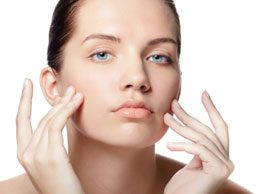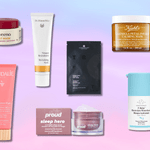Could facial oils benefit your skin?
Plant-based facial oils offer the latest remedy for dry skin. Could they benefit your skin?

Source: Best Health Magazine, January/February 2012
Apothecary-style facial oils aren’t a new invention; they’ve been stalwart moisturizers in French lines such as Clarins, Decléor and Darphin’some for decades. But today’s wave of eco-conscious beauty has sparked a surge of interest in facial oils because they use natural ingredients, and are often 100 percent natural. And, according to Dr. Sherry Hsiung, a New York’based dermatologist and a consulting dermatological expert for Kiehl’s, essential and botanical oils have a small molecular structure that make them able ‘to easily penetrate the skin. They’re rich in healthy skin essentials such as moisturizing fatty acids, including omega-3, -6 and -9, which strengthen the skin’s lipid layer and help stabilize natural oil production.
But why invest in one of these somewhat pricey products when you can grab some extra virgin olive oil from the kitchen cupboard? (After all, from olive to argan to coconut, plant-based oils have been used in beauty rituals around the world for centuries.) There’s no reason why you can’t. However, Kristen Ma, esthetician and co-owner of Pure + Simple holistic spas in Toronto, says facial oils are mixed to suit various skin types, and many contain therapeutic essential oils’such as lavender, jasmine, camomile, neroli and rose’to ensure the scents are just as pleasant as the effects they’ll have on your skin.
Who can benefit from facial oils?
People with sensitive skin could find relief with an oil. Typical skin creams contain around 70 percent water, so preservatives, chemicals and perfumes are added to many of them to eliminate bacterial growth, increase shelf life and achieve an appealing scent. However, according to Dr. Alastair Carruthers, a clinical professor of dermatology at the University of British Columbia, the additives also increase the chances of skin irritation and allergic reaction. Pure plant oils, on the other hand, typically do not contain preservatives or synthetic fragrances. (Many creams and serums with plant oils do contain additives, so if you are concerned, check the label.) They can also help relieve eczema, according to Dr. Francesca Fusco, an assistant clinical professor of dermatology at Mount Sinai School of Medicine in New York. Pure tea tree, peanut and oregano oils are all helpful.
Those with blemished, oily skin likely shudder at the thought of putting oil on their face, but according to Fusco, plant-based oils are non-comedogenic, meaning they’re not likely to clog pores and cause breakouts. She recommends them to patients seeking all-natural skin care or the benefits of aromatherapy, but she advises acne-prone patients to approach oils with caution’even all-natural products can trigger allergic reactions or interfere with acne medications.
Ma, who suffered from blemished skin for years, believes avoiding oils can actually exacerbate an acne problem. Stripping the skin of its natural oils causes dehydration, which can lead to overproduction of sebaceous oil (sebum). Without sufficient hydration, she says, excess sebum can create clogged pores and eventually breakouts.
Finally, if your skin is particularly dry, rich oils are ideal. In cold winter months, when nothing is nourishing enough, try layering an oil on top of your regular lotion or moisturizer for the ultimate moisture-locking effect.
Application tips
‘ Since oils lack the water component of creams, it’s best to apply them immediately after cleansing, while skin is still moist, so the oil can lock in the moisture.
‘ You might also like the regimen of using a hydrating facial mist just before you apply the oil. Again, the facial oil will lock in the water to keep the skin hydrated longer.
‘ Try this lymphatic drainage technique to help reduce facial puffiness: Apply oil with your fingertips using light, sweeping movements in a downward motion. Then press and release your fingertips, moving down your face, and finish by tapping very lightly all over.
Ease into it
If smoothing an oil onto your face still sounds daunting (and if the prices are more than what you typically spend on skin care), many mainstream brands are responding to consumer demand for natural ingredients by incorporating plant-based oils into their creams and serums. For example, Nivea Pure & Natural Moisturizing Day Care with organic Moroccan argan oil ($11, 50 mL) is free of parabens, silicones and artificial colours.
This article was originally titled "Sweet elixirs" in the January/February 2012 issue of Best Health. Subscribe today to get the full Best Health experience’and never miss an issue!




